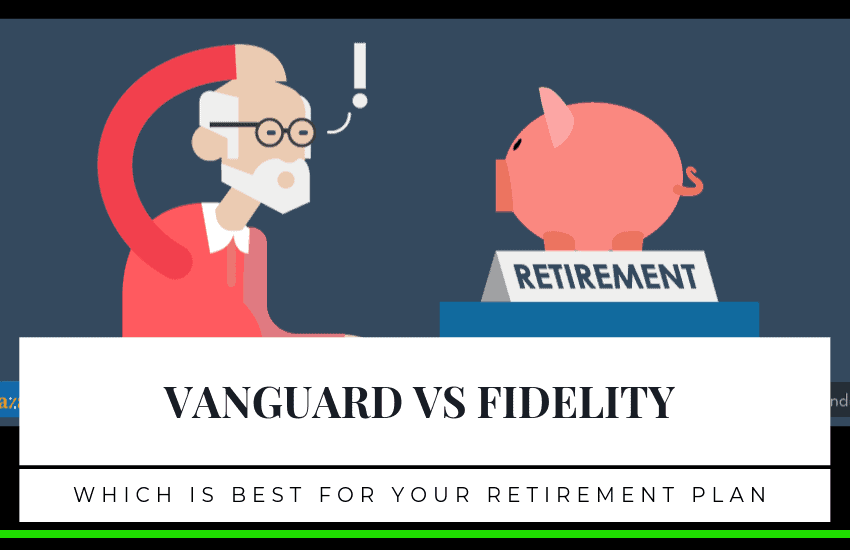- Best Medical Credit Cards: 12 Credit Cards for Medical Expenses - October 17, 2019
- Vanguard vs Fidelity: How To Choose The Right One - October 2, 2019
Do you envision sitting on a beautiful beach when you retire? Maybe you want your child to go to a very prestigious college and graduate with no debt. Companies such as Vanguard and Fidelity offer financial services to help you achieve your goals.
Vanguard and Fidelity sell a wide variety of financial products. These companies have different types of advisory services. As an individual investor, you must understand the features and costs so you can make the best choices.
Main Differences Between Vanguard vs Fidelity
The main differences between Vanguard vs Fidelity:
- Vanguard is a better option for long-term investing, whereas Fidelity is better for active investors.
- Vanguard was founded in 1974, whereas Fidelity was founded in 1946.
- Vanguard requires an initial investment of at least $3000, whereas Fidelity doesn’t require any.
- Vanguard has a mobile app that customers seem not to like well, whereas Fidelity has an app that all users love and that has lots of different analytics and live trading.
Roth & Traditional IRAs
You need to know about the different types of IRAs (Individual Retirement Accounts) so you can adequately compare the two companies. With a Roth IRA, you make after-tax contributions.
The benefits are you never pay penalties on withdrawals of contributions, and you don’t pay taxes on your earnings as long you are at least 59 ½ years old and meet a five-year holding period requirement.
You make pre-tax contributions to a Traditional IRA. The big benefit is you reduce your income taxes now while you save for retirement. However, you pay taxes on contributions and earnings when you withdraw them.
You can start a Roth or Traditional IRA with either service. Vanguard offers two types of funds, the Vanguard Target Retirement Fund and the Vanguard Star Fund, that allow you to open an IRA with only a $1,000 contribution. Vanguard waives account services fees on their IRAs when you agree to conditions such as receiving all documents electronically.
Fidelity has no minimum to open a Roth IRA or Traditional IRA. There are no annual account fees on Fidelity Roth or Traditional IRAs. You can start getting the savings and tax benefits with a much smaller initial investment.

How They Match Up- Other IRAs
Vanguard and Fidelity offer rollover, SEP, and Simple IRAS too. When you leave a job with a 401K, you can roll it over into an IRA to preserve the tax benefits. SEP IRAs are retirement savings plans for small business owners and self-employed people. A business with under 100 employees can offer Simple IRAs to employees.
Vanguard rollover IRAs have minimum contributions too. However, there is no minimum contribution to open a small business retirement account. Their small business specialists do not earn commissions on your plan.
Fidelity Rollover, SEP, and Simple IRAs do not require a minimum contribution. Fidelity also does not burden you with closing or annual fees.
The Difference in 529s
The cost of college is a major source of worry for many parents. A 529 plan allows you to invest money, and you do not have to pay income taxes on the earnings if you use them for educational expenses. If you live in a state with an income tax, you might get a tax break if you contribute to a 529 plan now.
Vanguard and Fidelity offer popular age-based investing options that enable you to move to more moderate to conservative investing portfolios the closer your child gets to college. Vanguard advertises a small .15% expense ratio on its age-based Vanguard 529 plan with no commissions, enrollment fees, or transfer costs. Fidelity’s expense ratios vary depending on the portfolio so you need to calculate your costs.

Grandparents can get involved in saving for college. Fidelity offers a College Gifting program. This offers estate planning benefits because grandparents can make certain contributions without getting hit with the gift tax.
Mutual Funds
A mutual fund is an investment product that buys a range of securities. It provides you with asset diversification and reduces volatility. You can also save on the commissions associated with purchasing individual stocks and bonds.
Vanguard offers a wide array of both taxable and tax-exempt funds. They offer a tool that allows you to compare the expense ratios and returns of up to five funds at a time. This allows you to quickly see the pros and cons of each investment vehicle.
Fidelity’s mutual funds range from conservative to very aggressive. The net and gross expense ratios vary from fund to fund so you need to carefully research the costs. None of the funds picks from Fidelity under the U.S. Equity/Large Blend category had loads or minimum purchase requirements.

ETFs
ETF stands for exchange-traded funds. Like a mutual fund, an ETF is a collection of individual stocks or bonds with a Portfolio Manager.
You only need to buy one share to get started with a Vanguard ETF. You can use a Vanguard brokerage account to make changes to your ETF commission-free. There is no set expense ratio; however, some such as the Total Stock Market ETF have a low .03% expense ratio.
Fidelity does not charge a commission when you buy any of its 28 ETFs online. You can also buy ETFs through iShares with your fidelity account. If you sell an ETF, they charge you an activity assessment fee.
Stock Trading
Both Vanguard and Fidelity have trading services for people who want to take more risks and exert more control over their investments. For individual stocks, Vanguard charges $7 for the first 25 trades if you have less than $50,000 invested with them. The fees decrease if you have more money under management at Vanguard.
Fidelity charges a flat fee of $4.95 per online trade. The rate does not change based on the dollar volume or value of trades. This fee is for trading U.S. equities.

Bonds
A bond is a financial product that pays you a fixed interest rate when you loan an organization (such as a state government or corporation) your money. Your earnings from interest are an income stream. Unlike stocks, you do not own shares of the company.
You can buy individual bonds, bond funds, and bond ETFs through Fidelity and Vanguard. Fidelity charges $1 per bond purchased online. Vanguard’s cost vary, but they highlight that you can buy many bond products commission-free.
CDs in Your Brokerage Account
People generally equate CDs (Certificates of Deposit) with banks. You deposit your money for a specific amount of time (say one year) and the lender pays you a higher interest rate. It is an FDIC insured investment.
Vanguard and Fidelity allow you to buy brokered CDs from issuing banks and hold them in your brokerage account. You get FDIC coverage because the issuing bank carries the obligation. Neither Vanguard or Fidelity charges a fee on the typical new issue CD. If you buy a CD on the secondary market, you pay a commission to Vanguard and Fidelity’s trading fee is $1 per CD.

Advisory Services
A Robo advisor provides you with recommendations based on your answers to a questionnaire. There is minimal contact with a person. This service allows companies to provide low-cost investment advice.
Fidelity offers a traditional Robo advisor called Fidelity Go. It invests a contribution as small as $10 and has a gross advisory fee of .35%. Fidelity also offers a hybrid plan which means you get a digitally devised strategy with access to some personal investment coaching. This service requires a $25,000 minimum investment, and a gross advisory fee of .50%.
Fidelity also offers higher-end services for when you have a larger nest egg. You can sign up for Wealth Management Services which provides you access to a specific advisor if you invest a minimum of $250,000. Fidelity also offers an advisor-led team (Private Wealth Management) to people who invest at least $2 million.
Vanguard offers personal financial advisors. They provide you with a financial plan and offer quarterly review/rebalancing of your portfolio. These personalized services are available to people with a minimum of $50,000 to invest, and the fee is .30% of the money you give them.

Educational Tools
Both Vanguard and Fidelity have educational tools so you can learn more about investing. Vanguard has an investor education center on its website. It gives you information on topics such as taxes and portfolio management.
Fidelity has webinars labeled beginner, intermediate, and advanced on a multitude of investment topics. They also have online events on topics such as technical analysis and their Active Trader Pro system. You can even take trading-focused classes.
Proud Histories
Vanguard and Fidelity are two of the most respected names in investing. Vanguard is unique in that its customers are the owners. This structure means that Vanguard has lower investment costs compared to its peers.
Fidelity started in 1946, and it began selling IRAs in 1975. Fidelity calls itself a pioneer in developing investment opportunities for Americans.
FAQs About Fidelity and Vanguard
No. While both are investment management companies, they still aren’t owned by the same CEO and they have been founded at different times (1946 and 1974).
While both are great options for IRA (Individual retirement account), Vanguard seems to offer better tax refunds and is more efficient than Fidelity.
Yes. Vanguard has NTF mutual funds (No Transaction Mutual Funds) that are sold 2 months within the purchase and these usually come with a $50 redemption fee on short term notice. There are also other fees related to a mutual fund with a balance under $10.000 and they re usually up to $20.



